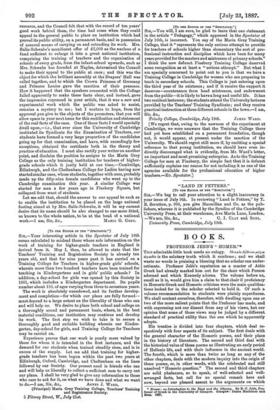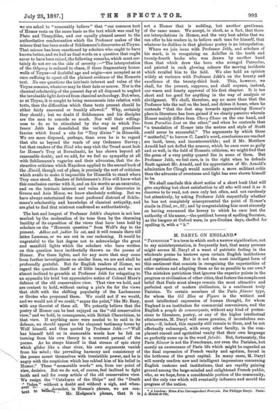BOOKS.
PROFESSOR JEBB'S "HOMER."*
This admirable little book needs no eulogy. IrlospOs /343Ttoy Istyx. siva ( Ur is the salutary truth which it confirms ; and we shall waste no words in praising a blessing that no scholar can under- estimate. Professor Jebb's reputation as a master of Attic Greek had already marked him out for the chair which Person. adorned and which Kennedy adorns. The volume before us, small as it is, would give him a claim to that chair if proficiency, in Homeric Greek and Homeric criticism were the main qualifica- tions looked for in the scholar selected to hold. it. Of such a volume recommendation to students were plainly superfluous. We shall content ourselves, therefore, with dwelling upon one or two of the more salient points that the Professor has made, and with expressing not our dissent from any of his views, but our opinion that some of those views may be judged by a different standard of practical utility than the one which he apparently adopts.
His treatise is divided into four chapters, which deal re- spectively with four aspects of its subject. The first deals with the general character of the Homeric poems, and their place in the history of literature. The second and third deal with the historical value of these poems as illustrating an early period of Hellenic life, and with their influence in the ancient world. The fourth, which is more than twice as long as any of the other chapters, deals with the modern inquiry into the origin of these poems, or, in other words, with the celebrated and still unsolved " Homeric question." The second and third chapters are solid phalanxes, so to speak, of well-selected and well- arranged facts, but call for no special remark here and now, beyond our pleased assent to the arguments on which.
• Homer: ms Introduction to the Iliad and the Odyssey. BNB. 0. Jebb, Pro- fesaor of Greek in the University of Glasgow. Glasgow: James klaelekese and
Sons. 1887.
we are asked to "reasonably believe" that "our common text of Homer rests on the same basis as the text which was read by Plato and Thacydides, and our equally pleased assent to the authoritative condemnation which the Professor makes of the misuse that has been made of Schliemann's discoveries at Tiryns. That misuse has been sanctioned by scholars who ought to have known better, and we hail as final words on a question that ought never to have been raised, the following remarks, which most cer- tainly do not err on the side of severity ; —" The interpretation of the Odyssey is reduced to chaos, if these fragmentary house- walls of Tiryns—of doubtful age and origin—are accepted as at once sufficing to upset all the plainest evidence of the Homeric text. No one questions the intrinsic interest and value of the Tiryna remains, whatever may be their date or source. Nor is the classical scholarship of the present day at all disposed to neglect the invaluable light derived from classical archaaology. But when, as at Tiryns, it is sought to bring monuments into relation with texts, then the difficulties which these texts present should be either fairly answered or frankly allowed." Why, certainly they should ; but we doubt if Schliemann and his disciples are the men to concede so much. Nor will their willing- ness to do so be stimulated by the way in which Pro- fessor Jebb has demolished the verbose and grandiose fancies which found a site for "Troy divine" in Hissarlik. We are more disposed, perhaps, than even he is to regard that site as beyond the reach of any Ordnance Survey ; but that readers of the Iliad who may visit the Tread must look for Homer's Troy at Burnabashi, he has shown beyond all reasonable doubt; and we add, for we feel no sympathy at all with Schliemann's vagaries and their advocates, that the de- structive criticism which Napoleon applied to the second book of the Zizeid, though out of place, is precisely the sort of criticism which avails to make it impossible for Hissarlik to stand where Troy once stood. Readers of Schliemann's Rios will know what this conclusion carries with it, and on his merits as an excavator, and on the intrinsic interest and value of his discoveries in Greece and Asia Minor, we know absolutely nothing. But we have always entertained the most profound distrust of Schlie- mann's scholarship and knowledge of classical antiquity, and are glad to find that mistrust confirmed so authoritatively.
The last and longest of Professor Jebb's chapters is not lees marked by the moderation of its tone than by the charming lucidity of its exposition of the views that have been held by scholars on the "Homeric question" from Wolf's day to the present. .eldhise sub :Iodise Us eat, and it will remain there till latter Lammas, or we are out in our reckoning. It would be ungrateful to the last degree not to acknowledge the great and manifold lights which the scholars who have written on this question have incidentally thrown on the poems of Homer. For these lights, and for any more that may come from farther investigations on similar lines, we are and shall be profoundly grateful. But for English readers of Homer, we regard the question itself as of little importance, and we are almost inclined to grumble at Professor Jebb for relegating to an appendix his brief but appreciative notice of Colonel Mare's defence of the old conservative view. That view we hold, and are content to hold, without caring a pin's fee for the views that shift with the shifting popularity of the Lachmanns or Grotes who propound them. We could not if we would, and we would not if we could, "argue the point," like Mr. Easy, with any theorist of them alL We potently believe that the poetry of Homer can be beet enjoyed on the "old conservative view," and we hold, in convenience, with British Chauvinism, to that view. If anything more were needed to be said in its defence, we should appeal to the eloquent testimony borne by Wolf himself, and thus quoted by Professor Jebb :—" Wolf has himself told us in memorable words how he felt on turning from his own theory to a renewed perusal of the poems. As he steeps himself in that stream of epic story which glides like a clear river, his own arguments vanish
from his mind ; the pervading harmony and consistency of the poems assert themselves with irresistible power, and he is angry with the scepticism which has robbed him of his belief in Homer." These "memorable words" are, from our point of view, decisive. But we do not, of course, feel inclined to fight tooth and nail for every article of the old conservative view. We resign the "Catalogue of the Ships" and the "Death -` Delon" without a doubt and without a sigh, and when- ever ' bizocl' ormitat, in Horace'e phrase, we are con-
tent 1.4." ' • Mr. Hodgson's phrase, that it is not a Homer that is nodding, but another gentleman of the same name. We accept, in short, as a fact, that there are interpolations in Homer, and the very beat advice that we can offer to his readers is, to believe each man for himself, that whatever he dislikes in that glorious poetry is an interpolation.
Where we join issue with Professor Jebb, and scholars of his mark, is in recognising an Achilles in the tenth and twenty-fourth books who was drawn by another hand than that which drew the hero who avenged Patroclus, and painted in such glowing colours the moving incidents which recalled him to the field. We also hold an opinion widely at variance with Professor Jebb's on the beauty and excellence of the twenty-third book. This, however, we shall, for the present, suppress, and shall express, instead, our warm and hearty approval of his first chapter. It is too short and too good for anything in the way of analysis or abridgment. We shall, therefore, say no more than that the Professor hits the nail on the head, and drives it home, when he contends "that the first step towards appreciating Homer's place in literature has been gained if we clearly perceive wherein Homer mainly differs from Chevy Chase on the one hand, and from Paradise Lost on the other," and when he contends that "a translation of Homer into the metres and style of Scott could never be successful." The arguments by which these " matterfal," to borrow C. Lamb's word, conclusions are reached are lucid, terse, and incontrovertible ; and if Mr. Matthew Arnold had not doffed the armour, which he once wore so gaily and so well, in the field of Homeric criticism, we might find that the germ of a very pretty quarrel lies in some of them. But Professor Jebb, we feel sure, is in the right when he defends Scott against Mr. Arnold, and his appreciation of Mr. Arnold'e admiration for Clough would conciliate a more militant critic than the advocate of sweetness and light has ever shown himself to be.
We shall conclude this short notice of a short book that will give anything but short satisfaction to all who will read it as it deserves to be read, not once only but often, and not carelessly but attentively, by asking Professor Jebb respectfully whether he has not completely misrepresented the point of Homer's simile in Iliad, xv., 82 ; and by congratulating him most sincerely on having renounced the heresy to which he once lent the authority of his name,—the pestilent heresy of spelling Socrates, as the bargees at Oxford were, in pre-Grotian days, chaffed for spelling it, with a " k."



































 Previous page
Previous page